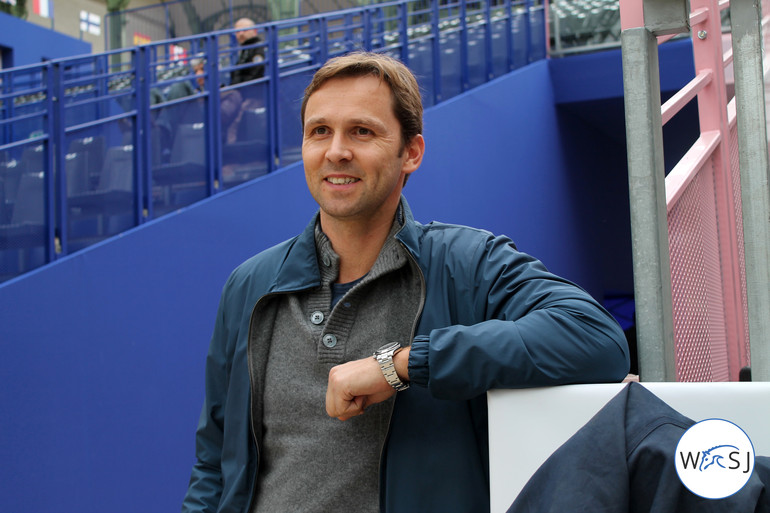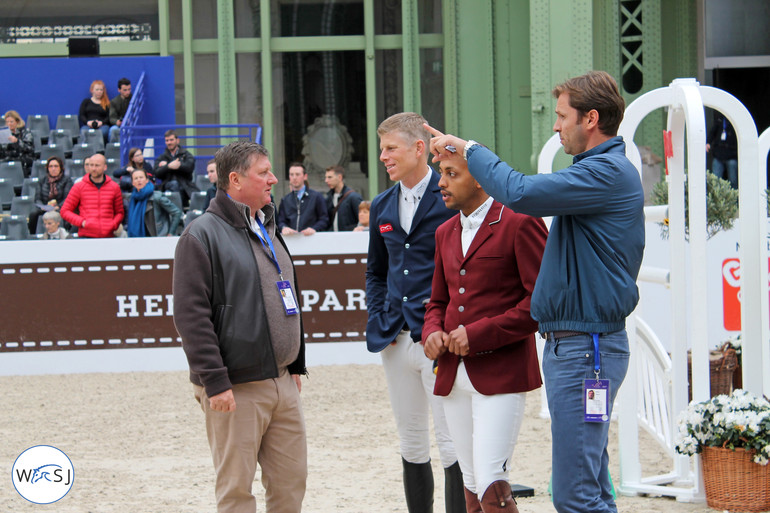Over the past few years, the Qatari showjumping team has made their name known – growing into become constantly present at the top of our sport. The team qualified for the Olympic Games in Rio, and Sheik Ali Bin Khalid Al Thani went all the way to the final placing sixth individually.
Observing the Qatari team, there is always an entourage around them – but there is one person in particular who is always there. Fairly unknown to the public – but referred to as “a brother” if you ask the Qatari top riders – the tall, polite Belgian trainer Willem Meeus has been a key player when it comes to building up the Qatari success.
“Willem has worked with us for so many years, he is not a trainer for us anymore – he is like a brother. I see him more than I see my own family,” Sheik Ali Bin Khalid Al Thani tells World of Showjumping. “I think Willem is one of the reasons for our success; he has given us all his heart and he works very hard. We appreciate his patience and everything he has done for us.”
Curious to find out more about the unique relationship between a quiet Belgian and the colourful Qataris, World of Showjumping sat down with Willem Meeus during the CSI5* event in Doha, Qatar, to hear about where it all began and how a competitive rider turned into a trainer and a mentor for one of the most ambitious equestrian nations in the world.
“I was working in Belgium at Erik Laenen’s stables, and the Qataris came there in 2004 ahead of the 2006 Asian Games to prepare for that championship. I was competing myself and they came with me to the shows, so I helped them on the side,” Willem tells us about the beginning of a long partnership. “After that I started to teach them in Qatar as well, so I travelled back and forth. It became hard to combine my own riding with the teaching, and when the Qataris asked for me to train them full time I said yes.”
Growing up, becoming a trainer was nothing Willem planned to do. “I was really crazy about riding, I just wanted to ride and compete – I was very passionate and ambitious about it. I think that if you would have told me when I was 18-years-old that I would become a trainer, I am sure I would not have believed it back then. I rode for a dealing stable, so I never had good horses for a longer time but I got a taste of the top sport and I really liked it.”
After a couple of years, Jan Tops got involved in the management and training of the Qataris. However, from the beginning it had been the Qatari Federation that managed the team and once the Qatari Armed Forces took over the management the team went to train in Germany. This was the beginning of a new assignment for Willem. “At this point I started to work for Jan and Stal Tops. A year later the Qatari Federation put together a new team with the goal to qualify for the Rio Olympics, and sent this team to Stal Tops for training.”
The goal was reached, and last year the Qatari team travelled to Rio. “It was a great experience, qualifying the team for the Rio Olympics. We didn’t only win the qualifier, but we won properly – against other strong teams. The Olympics in Rio was an unbelievable experience and we were very happy about our results, even if just one-time penalty kept us away from the team final. But I believe the team did a great job at their first Olympic Games and represented their country well – Sheik Ali being sixth individually was an amazing result.”
But where does a once ambitious rider find the motivation to stand on the side line and teach patiently? “I love the sport and I love the horses – at Stal Tops in general, there is a drive of performing and pushing yourself to the best you can be,” Willem tells us. “If I feel that the riders are keen to learn, that motivates me in the end. It is very important, that if you do this job, you have to really want to give your all and love what you do – doing anything only for the money, you can’t do that,” he says.
The goals for the future with the team are set high. “The main goal is Tokyo, as well as being present at the main championships and being considered as a strong competitor. Also to get as many riders as possible into a strong position on the Longines Ranking, where Ali is now ranked 37 and Bassem 115, is naturally a part of the plan,” Willem says.
Willem is now sharing his time between the Middle-East and Europe. “From November to the end of March, the riders are normally participating in the Arab League World Cup. I am often here in Qatar; I think this year I went back to Europe two or three times – but only for a few days. From March on we are based in Europe. I come from a normal family, they have nothing to do with horses. My fiancée rode in the past, so she knows the sport a little bit. For sure they would all like to spend more time with me, but they know how much I love the sport. My fiancée does a great effort to meet as much as possible and I travel to her as often as I can,” Willem tells about the challenges of balancing an intense work and private life.
Listening Willem talk about his team and the horses, it really comes clear how close to his heart they all are. “We have so many good horses and they all have their unique qualities. I think we are very fortunate to work with them,” Willem says.
His years of experience has given Willem a unique insight in what to look for in a horse and how to find the perfect match. “These days, rideability is very important and with all the fast classes, the horses need to have the right amount of blood. This also creates a challenge, because for some riders too much blood can be a problem as can too little blood – so you really need to match the temperament of the horse with their rider. But in the end, I think that one of the most important qualities that I always look for in a horse, is that they really have to be smart.”
Managing the daily life of eight riders and around 30 horses takes a big team. “We have 11-12 grooms and a stable manager, there is a vet and a farrier. It takes a lot of communication, as every rider has an individual plan for their horses,” Willem tells.
The intense schedule does not leave a lot of free time however. “I try to take a Sunday off if we have a weekend without a show – that doesn’t happen too often though. My job is intense, but it does not feel like that, as I enjoy what I do,” Willem concludes.
Another top Qatari rider, who was also a part of the successful Olympic team in Rio, is Bassem Hassan Muhammed who confirms Sheik Ali’s opinion about their passionate trainer. “Willem helps all of us with everything and he really puts his heart into the work. He has been there since the beginning and we all feel comfortable and confident when he is around. His mind and his heart are the best qualities about him – we are very fortunate to have someone like him. I am still young, so I look up to Willem as a big brother.”
Text © World of Showjumping by Nanna Nieminen // Picture © Jenny Abrahamsson (No reproduction without permission)










